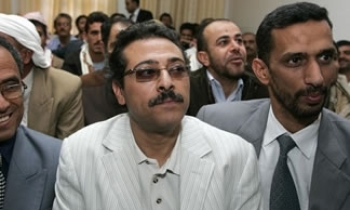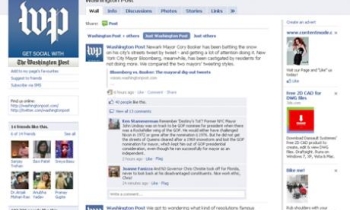General Electric Co. and Pearson Plc, weighing a bid for Dow Jones & Co., may struggle both to top a $5 billion offer from Rupert Murdoch’s News Corp. and to agree on a proposed structure for the combined business.
Murdoch’s $60-a-share bid values the publisher of the Wall Street Journal at 65 percent more than its price before Dow Jones disclosed the offer. GE and Pearson envision an entity that would give Dow Jones’s controlling Bancroft family a minority stake, according to a person familiar with the talks.
The price and complexity of such a deal may be insurmountable obstacles, said Richard Dorfman, managing director of Richard Alan Inc., a New York-based investment firm focusing on media. “I just don’t see how a three-party joint venture, even with the big names involved, can snatch the deal from Murdoch,” he said.
Reflecting investor skepticism about prospects for a new offer, Dow Jones shares remained below Murdoch’s bid yesterday, rising 2 cents to $59.03 in New York Stock Exchange composite trading. They have climbed 62 percent since April 30.
Pearson shares rose 0.3 percent to 864.5 pence at 8:38 a.m. in London. GE shares fell 5 cents to $38.07 yesterday in the U.S., and traded at the equivalent of $38.05 at 9:38 a.m. in Frankfurt.
Not Likely
A higher bid than Murdoch’s is unlikely, said Charles Wrubel, managing partner of AdMedia Partners, New York-based consulting and investment banking group.
“Bidding up for Dow Jones has the potential of overvaluing the company to the point where it might not be worth it in the long run,” Wrubel said. “Murdoch appears to have more of a stomach to handle a bidding war.”
GE and Pearson are discussing a plan to join Dow Jones with GE’s CNBC unit and Pearson’s Financial Times in a closely held venture, said the person with knowledge of the talks, who declined to be identified because they are private and preliminary. The offer may appeal to the Bancrofts, who have balked at selling to Murdoch on concern he would use the news company to advance his business and political interests.
Under the plan, GE, based in Fairfield, Connecticut, and London-based Pearson would each hold 40 percent to 45 percent of the new company and give a 10 percent to 20 percent stake to the Bancrofts, the Wall Street Journal reported June 17. The structure would allow some family members to sell their Dow Jones shares and let others roll their stock into the venture to avoid taxes, the newspaper said.
`Financial Metrics’
“It will not be easy for them to come up with a joint venture structure that will satisfy GE, Pearson and the Bancroft family,” Richard Alan’s Dorfman said. “This sale has to be run at this point like a traditional auction based on financial metrics, not editorial independence.”
The Bancrofts said in a May 31 statement they would consider offers for Dow Jones, including the News Corp. bid. The family said last week it was still working on a proposal to send to News Corp. designed to protect the Journal’s editorial independence.
Billionaire Ron Burkle, who has agreed to work with Dow Jones’s union to try to find new bidders, may make a “long-shot offer” this week, Fortune reported yesterday on its Web site.
Andrea Grinbaum, a spokeswoman for Dow Jones, said yesterday she had no information on new discussions. Roy Winnick, a Bancroft family spokesman, said he “can’t comment on rumors.” Pearson spokesman Luke Swanson, News Corp. spokesman Andrew Butcher, and Kathy Kelly-Brown, a spokeswoman for GE’s NBC Universal, declined to comment.
Shareholder Opposition
Richard Buxton, head of U.K. equities at London-based asset management group Schroders Plc, which owns slightly more than 4 percent of Pearson, opposes a bid by the publisher for Dow Jones, the Daily Telegraph reported. Buxton told the newspaper he found it difficult to see how an offer could be structured that would be successful against News Corp. and that most shareholders would not want to see a lot of money being spent on an acquisition.
Credit-default swaps based on 10 million euros of Pearson debt were little changed today. The contracts, used to speculate on a company’s ability to repay debt, traded at 43,000 euros at 8 a.m., according to Deutsche Bank AG. An increase indicates a deteriorating perception of credit quality. Pearson had net debt of 1.06 billion pounds ($2.1 billion) at the end of 2006.
Defensive Move?
CNBC, the business news cable-television channel owned by NBC Universal, has a contract to share content with the Wall Street Journal through 2012. News Corp. plans to start a business news channel this year to compete with CNBC and Bloomberg LP, owner of Bloomberg News. Bloomberg also competes with Dow Jones and Pearson in providing financial news and information.
GE and Pearson are eager to guard their own investments against a possible News Corp.-Dow Jones tie-up, Peter Kreisky, president of Kreisky Media Consultancy in Boston, said in an interview.
“The major strategic reason for doing this is defensive,” Kreisky said. “But that’s not enough. These companies have to prove to their shareholders that doing this deal is smart long- term, not something they’ll have to sell at a loss in five years.”
Any bid from GE and Pearson that falls short of News Corp.’s offer may make Dow Jones and the Bancrofts susceptible to litigation, said David Joyce, a media analyst at Miller Tabak & Co. in New York.
“It could open the Bancroft family to lawsuits from minority shareholders if they take something lower based on the rationale that they want to protect editorial independence,” Joyce said. “It could open a can of worms.”









